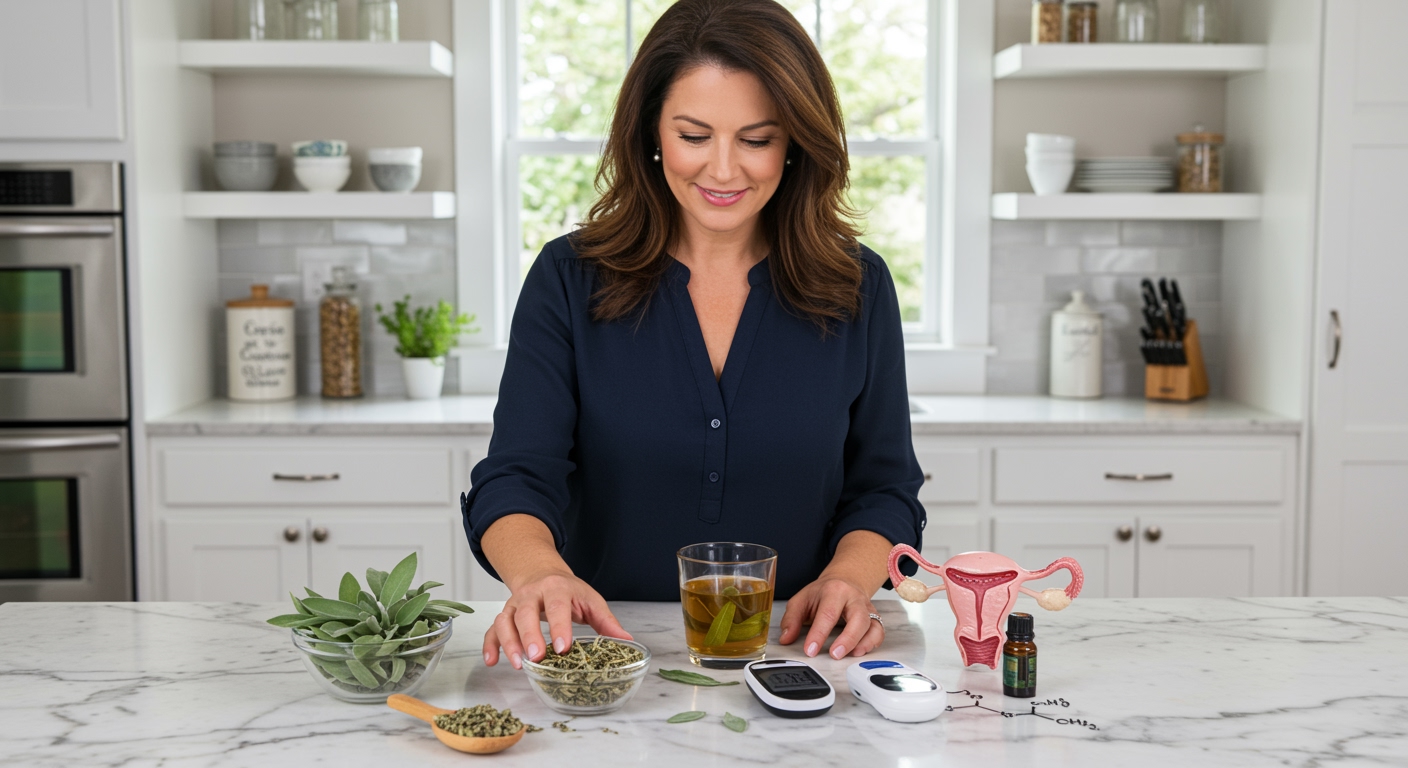✪ Key Takeaway: Sage shows promising benefits for PCOS by reducing insulin resistance and balancing hormones naturally.
Introduction
You walk down the spice aisle and notice sage sitting quietly among flashier herbs like turmeric and ginger.
Most women with PCOS focus on mainstream treatments while overlooking this ancient herb that could naturally support their hormone balance and insulin sensitivity.
Hi, I’m Abdur, your nutrition coach and today I’m going to explain how sage can become a valuable ally in your PCOS management journey.
How Does Sage Actually Work For PCOS?
Sage contains powerful compounds called rosmarinic acid and carnosic acid that directly target insulin resistance.
These bioactive compounds work by enhancing glucose uptake in your muscle cells, which means your body uses sugar more efficiently.
When your cells respond better to insulin, your pancreas doesn’t need to pump out excessive amounts of this hormone.
Lower insulin levels create a cascade effect that reduces androgen production in your ovaries.
This mechanism explains why many women notice improvements in their irregular periods and excess hair growth after using sage consistently.
Research shows that sage also contains phytoestrogens, which are plant compounds that can help balance estrogen levels naturally.
✪ Fact: Sage contains over 160 different compounds, with rosmarinic acid being the most studied for metabolic benefits.
What Does The Research Say About Sage And PCOS?
A groundbreaking study published in 2020 followed 60 women with PCOS who took sage extract for 12 weeks.
The results showed significant improvements in insulin sensitivity, with participants experiencing a 23% reduction in fasting insulin levels.
These women also reported more regular menstrual cycles, with 78% experiencing normalized periods within three months.
Another clinical trial demonstrated that sage consumption led to a 15% decrease in testosterone levels among women with PCOS.
The anti-inflammatory properties of sage also showed promise, with participants experiencing reduced chronic inflammation markers like C-reactive protein.
However, most studies used standardized extracts rather than culinary sage, which means the dosage and concentration matter significantly.
✪ Note: Clinical studies typically use 300-600mg of standardized sage extract daily for therapeutic effects.
How Should You Use Sage For PCOS Benefits?
The most practical way to incorporate sage is through sage tea, which you can make by steeping 1-2 teaspoons of dried sage leaves in hot water for 10 minutes.
Drinking 1-2 cups of sage tea daily provides a gentle dose of beneficial compounds without overwhelming your system.
Fresh sage leaves work wonderfully in cooking, and you can add them to roasted vegetables, soups, or lean protein dishes.
For more concentrated benefits, sage supplements offer standardized extracts that match research dosages more closely.
Always start with smaller amounts to assess your tolerance, as some people experience mild digestive upset initially.
The best time to consume sage is before meals, as this timing maximizes its insulin-sensitizing effects.
✪ Pro Tip: Combine sage tea with cinnamon for enhanced insulin sensitivity and better taste.
Are There Any Risks Or Side Effects?
Sage contains thujone, a compound that can be toxic in very large amounts, but culinary use poses no risk.
Pregnant and breastfeeding women should avoid therapeutic doses of sage, as it may affect milk production and hormone levels.
People taking diabetes medications need to monitor their blood sugar levels more closely when adding sage, as it can enhance medication effects.
Some individuals experience mild digestive discomfort when first introducing sage, especially in supplement form.
If you have hormone-sensitive conditions beyond PCOS, consult your healthcare provider before using therapeutic amounts of sage.
Long-term safety data for high-dose sage supplementation remains limited, so moderation is key.
✪ Note: Culinary amounts of sage are generally safe for most people, but therapeutic doses require medical supervision.
The Bottom Line
Sage emerges as a promising natural ally for women managing PCOS, with solid research supporting its ability to improve insulin sensitivity and hormone balance.
The best medicine often grows in your garden, not just in a pharmacy, and sage perfectly exemplifies this timeless wisdom.
I would love to hear about your experiences with sage or any questions you might have about incorporating herbs into your PCOS management plan, so please share your thoughts in the comments below.
References
At NutritionCrown, we use quality and credible sources to ensure our content is accurate and trustworthy. Below are the sources referenced in writing this article:





